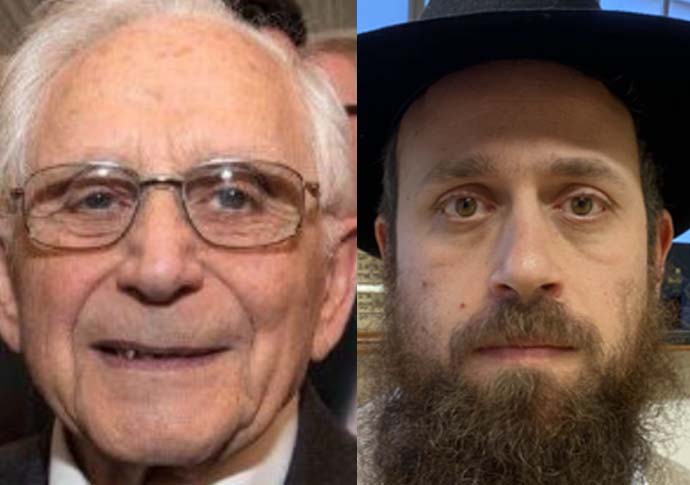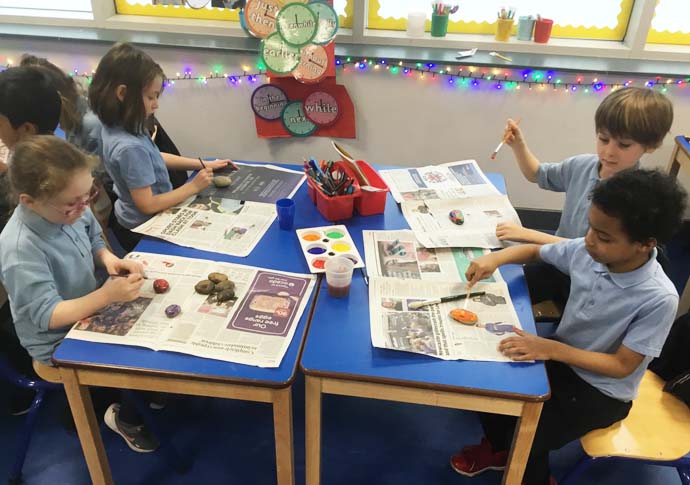‘Day to stop and think is so important’
77 years on, rabbi explains why Holocaust memorial reflection becomes ‘ever-more relevant’
Friday, 28th January 2022 — By Anna Lamche

Harry Olmer and Rabbi Mendy Korer
REMEMBERING the Holocaust is “vitally important” to give society a “sense of direction and purpose”, a rabbi said, as people across the world paused to remember its victims.
Yesterday (Thursday) marked Holocaust Memorial Day – and the 77th anniversary of the liberation of Auschwitz concentration camp by Soviet forces.
The day offers a moment to remember all those murdered, and the subsequent mass killings in Cambodia, Rwanda, Bosnia, and Darfur.
Holocaust survivor Harry Olmer shared his story at an event organised by Islington Council, while children at Whitehall Park School were encouraged to paint “Foundation Stones” which will form part of a new memorial for the victims of genocide.
At Chabad Lubavitch, Islington’s synagogue, there will be a special prayer service tomorrow (Saturday) to remember those who perished in the Holocaust, led by Rabbi Mendy Korer.
“Having a day to stop and reflect and think about both the memory of the people and the causes, and think about how we can be better people now, is vitally important,” he said.
“In my 10 years of being a community leader, year on year it feels ever-more relevant.
“Whichever climate we’re in, whichever environment we’re in, finding a personal meaning and direction to go in and improve society is relevant. A big stand-out day [such as Holocaust Memorial Day] allows us to think, ‘Where do we want to be?’ Many Jewish people’s families were touched by the horrors of the Shoah.

Whitehall Park pupils painting ‘Foundation Stones’
“Almost all Jewish people that have European roots were impacted by the Holocaust, whether it’s a direct or indirect relative,” Rabbi Mendy said. “My grandmother escaped Germany – she was on one of the last boats to leave Germany in the summer of 1939 and got a job in Hackney as an au pair.”
There are now 550 registered Holocaust survivors still alive in the UK – and Rabbi Mendy has stressed the importance of passing the story on to young people. He described a moment when his extended family gathered at his grandmother’s home.
“We asked her: would you like to share a story with your great-grandchildren? The one story she could think of sharing with her family was the story of the Holocaust, and how her sister and her nieces and nephews were killed,” Rabbi Mendy said.
“It was the one story she wanted to tell – the long-lasting impact of hatred and how far and deep that goes.
“That’s what strikes so deeply in the heart.
“After the Holocaust, people said: ‘Never again’. Regretfully, it’s happened again and again. Human tendency, and the extremes within human tendency, haven’t changed, and therefore continuing to remind ourselves – even while living in the relative safety of a democratic country – there are extremes that don’t go away.”
There are vital lessons still to be learned from history, Rabbi Mendy said, adding: “I believe each and every individual is duty-bound to find something new that they can do each and every day of unsolicited kindness. Making it into a daily habit of putting ourselves out and creating a positive society – [that’s] the best lesson we can learn from the past.”